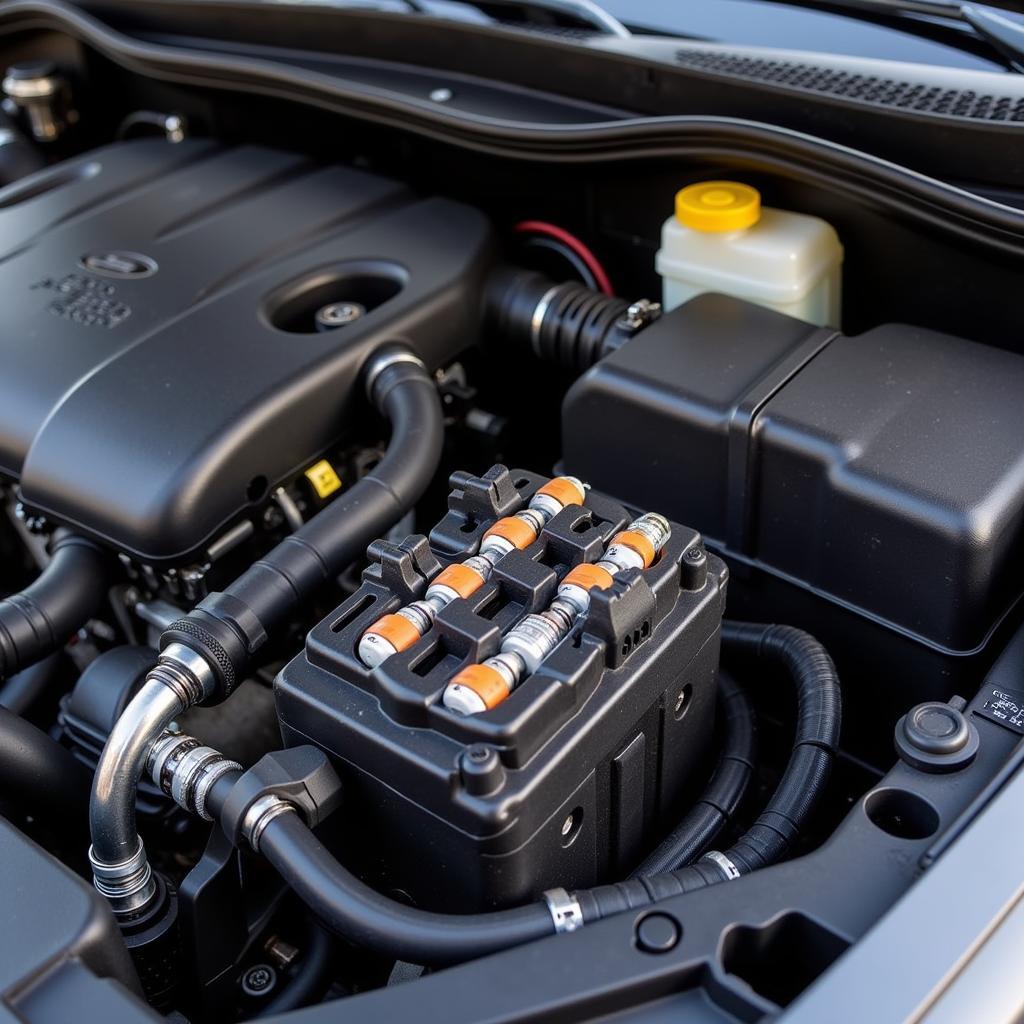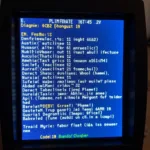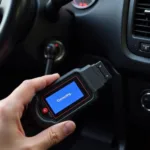The “Check Engine” light is never a welcome sight, especially when your trusty Ford Explorer Sport seems to be running fine. This might be the case when you’re faced with a P0300 OBD2 code, indicating a random misfire. While you might not notice any significant drivability issues, ignoring this code can lead to more serious engine problems and costly repairs down the line. This article will delve deep into the P0300 code, its potential causes on a Ford Explorer Sport, and what you can do to address it.
What Does a P0300 Code Mean on My Ford Explorer Sport?
The P0300 diagnostic trouble code (DTC) specifically points to random or multiple cylinder misfires detected by your vehicle’s engine control unit (ECU). Unlike codes like P0301 (cylinder 1 misfire) or P0304 (cylinder 4 misfire) which pinpoint the problematic cylinder, P0300 suggests the misfires are inconsistent and not isolated to a specific cylinder. This “randomness” can make diagnosing the root cause more challenging.
Why Does My Ford Explorer Sport Have a P0300 Code But No Drivability Issues?
While misfires often result in noticeable symptoms like engine shaking, rough idling, or loss of power, there are instances where a P0300 code pops up without any apparent driving problems. This doesn’t mean the problem doesn’t exist; it just might not be severe enough to cause noticeable symptoms…yet.
Here are a few reasons why your Ford Explorer Sport might be experiencing misfires without showing obvious signs:
- Early Stages of a Developing Issue: The problem might be in its early stages, and the misfires are infrequent or minor enough that your engine compensates without causing noticeable issues.
- Intermittent Issues: The underlying cause, such as a faulty sensor or wiring issue, could be intermittent. The misfires might occur only under specific conditions or at random times, making them hard to detect during regular driving.
- Engine Compensation: Modern engines are designed with sophisticated computer systems that can often compensate for minor issues. Your ECU might be adjusting fuel-air mixture or ignition timing to counter the misfires, masking the symptoms temporarily.
Common Causes of P0300 in a Ford Explorer Sport
While a P0300 code on your Ford Explorer Sport might not immediately translate to a breakdown, it’s crucial to investigate and address the root cause to prevent potential engine damage and ensure optimal performance. Here are some common culprits behind the P0300 code:
- Worn Spark Plugs: Spark plugs are responsible for igniting the fuel-air mixture in the cylinders. Worn or fouled spark plugs can cause weak or inconsistent sparks, leading to misfires.
- Faulty Ignition Coils: Ignition coils provide the high voltage needed for the spark plugs to fire. A failing ignition coil can disrupt the spark delivery, resulting in misfires.
- Vacuum Leaks: A leak in the intake manifold or vacuum hoses can disrupt the engine’s air-fuel ratio, leading to incomplete combustion and misfires.
- Fuel System Issues: Problems with the fuel injectors, fuel pump, or fuel filter can disrupt the fuel delivery to the cylinders, causing misfires.
- Catalytic Converter Problems: While less common, a clogged or failing catalytic converter can create excessive backpressure in the exhaust system, leading to misfires.
- Sensor Malfunctions: Issues with sensors like the mass airflow sensor (MAF), oxygen sensor (O2), or throttle position sensor (TPS) can disrupt the engine’s air-fuel mixture calculations, leading to misfires.
Diagnosing and Fixing the P0300 Code on Your Ford Explorer Sport
Diagnosing the exact cause of a P0300 code often requires going beyond simply reading the code. It involves a systematic approach to identify the root cause and implement the right fix. Here’s a step-by-step guide:
- Read the Code: Use an OBD2 scanner to read the specific trouble codes stored in your vehicle’s ECU. Note down all the codes present, as multiple codes can offer clues for a more accurate diagnosis.
- Inspect for Visible Issues: Start with a visual inspection of the engine bay, checking for loose connections, damaged wires, vacuum leaks, or any other obvious signs of trouble.
- Check Spark Plugs and Wires: Remove and inspect the spark plugs for signs of wear, fouling, or damage. Consider replacing them if they are old or worn. Also, check the spark plug wires for cracks, burns, or loose connections.
- Inspect Ignition Coils: Test the ignition coils for proper resistance and spark output. Consider replacing them if you suspect a problem.
- Check for Vacuum Leaks: Inspect the intake manifold, vacuum hoses, and other related components for leaks. Use a carburetor cleaner or a smoke machine to help pinpoint leaks.
- Inspect Fuel System Components: Check the fuel pressure, fuel injectors, fuel filter, and fuel pump for proper operation. Consider cleaning or replacing components as needed.
- Diagnose Sensor Issues: Use an OBD2 scanner to monitor live data from various sensors, such as MAF, O2, and TPS, to identify any inconsistencies or malfunctions.
Expert Insights
“Many car owners tend to dismiss the P0300 code when they don’t experience immediate drivability issues. However, this is a misconception that can lead to more significant problems down the line. Remember, early detection is key to preventing costly repairs.” – David Miller, ASE Certified Master Technician
Conclusion
A P0300 code on your Ford Explorer Sport, even without noticeable driving problems, is a sign that shouldn’t be ignored. While it might seem like a minor annoyance, addressing it promptly can prevent more severe engine problems and costly repairs in the future. By understanding the potential causes and following the diagnostic steps outlined in this article, you can ensure your Ford Explorer Sport keeps running smoothly for miles to come.
FAQs
Q: Can I still drive my Ford Explorer Sport with a P0300 code?
A: While you might not experience major drivability issues, driving with a P0300 code can potentially worsen the underlying problem and even damage your engine in the long run. It’s best to get it diagnosed and resolved as soon as possible.
Q: How much does it cost to fix a P0300 code?
A: The cost of fixing a P0300 code varies greatly depending on the root cause. Simple fixes like spark plug replacements can be relatively inexpensive, while more complex repairs involving fuel system components or sensors can be more costly.
Q: Can I fix a P0300 code myself?
A: If you have some mechanical expertise and the right tools, you might be able to handle some basic fixes like spark plug replacements or cleaning the MAF sensor. However, it’s generally recommended to seek professional help for more complex diagnoses and repairs.
Need Help with Your Ford Explorer Sport P0300 Code?
Experiencing a P0300 code on your Ford Explorer Sport? Our team of expert mechanics is here to help. Contact us today for professional diagnostics and repair services to get your vehicle back on the road in no time.
WhatsApp: +1(641)206-8880
Email: [email protected]
We offer 24/7 customer support to answer all your queries.


